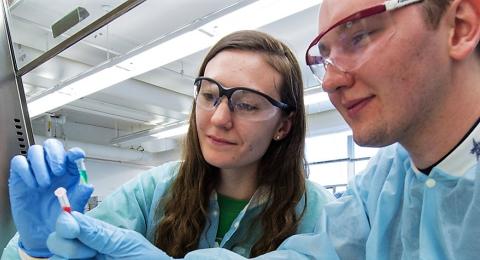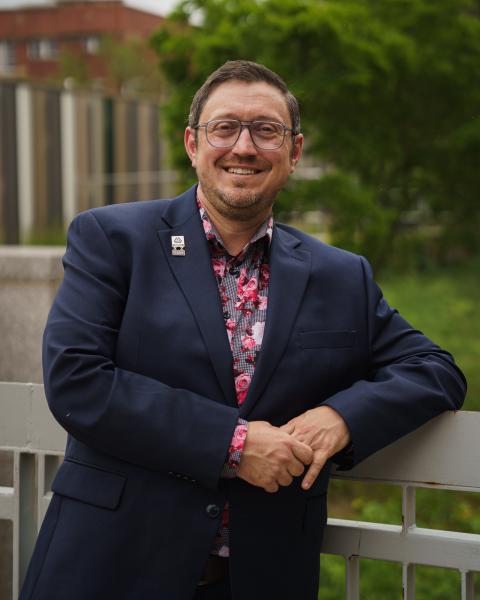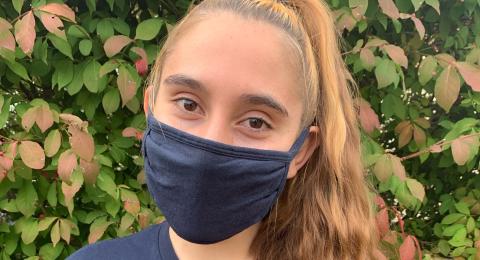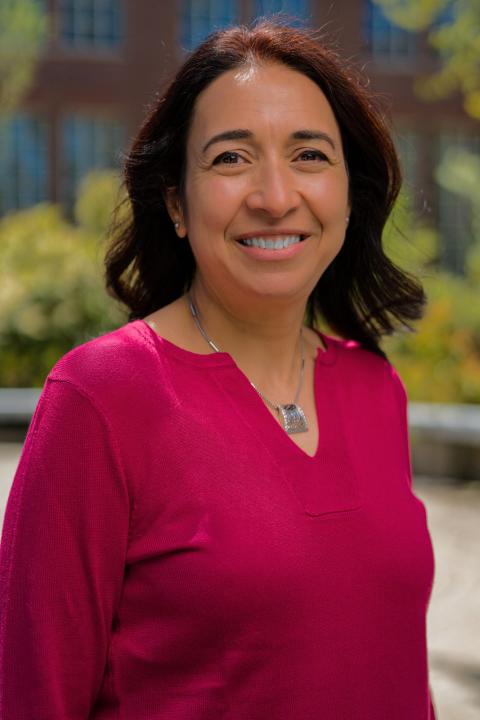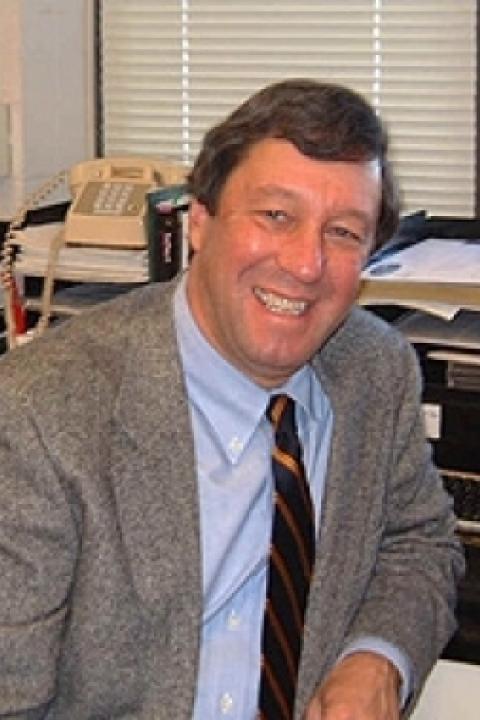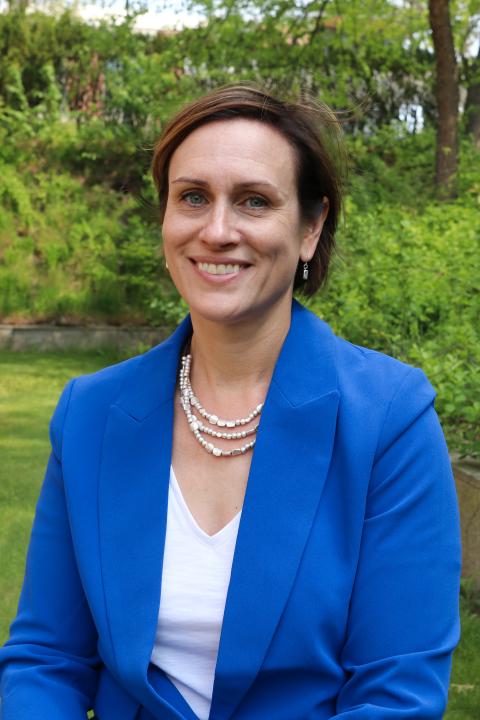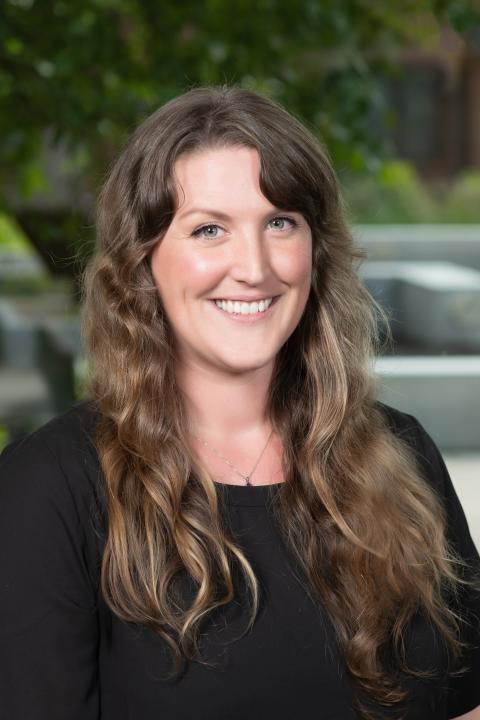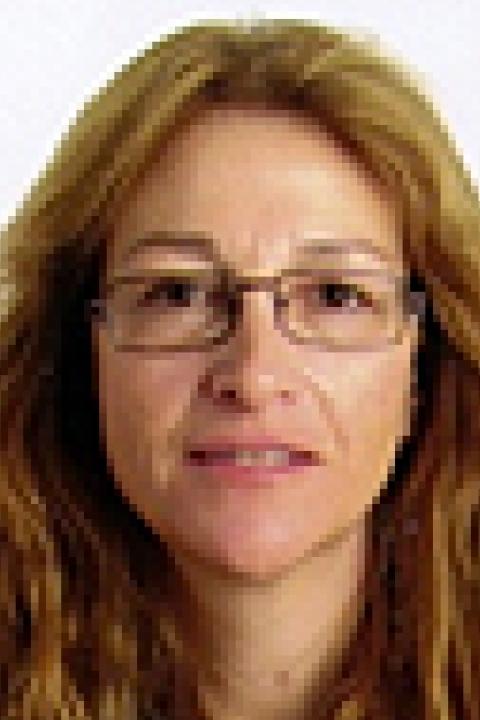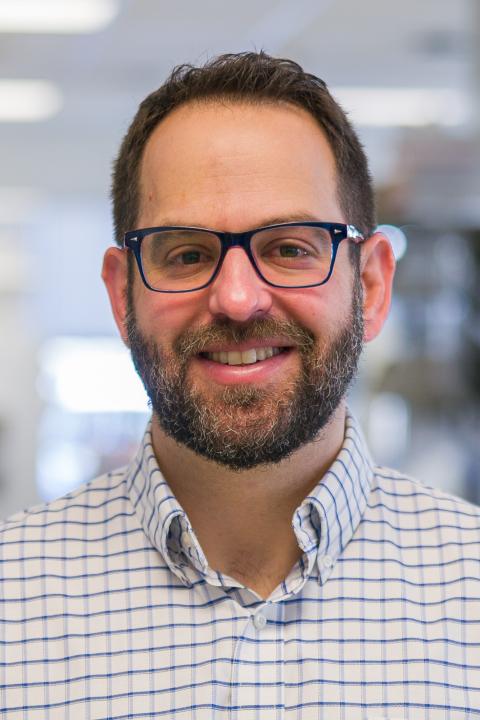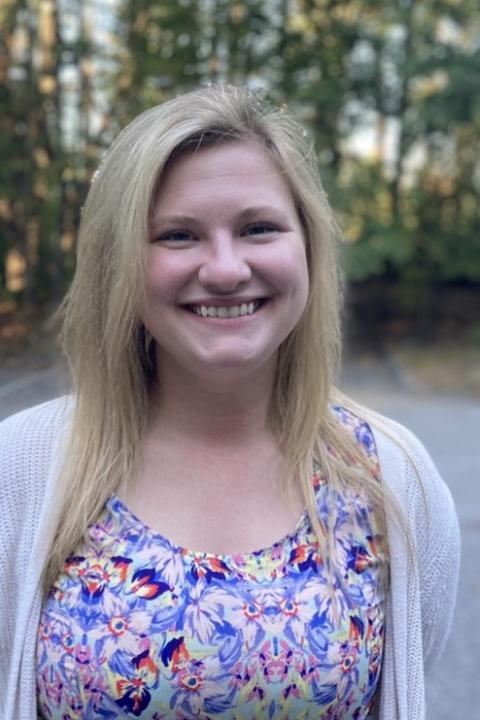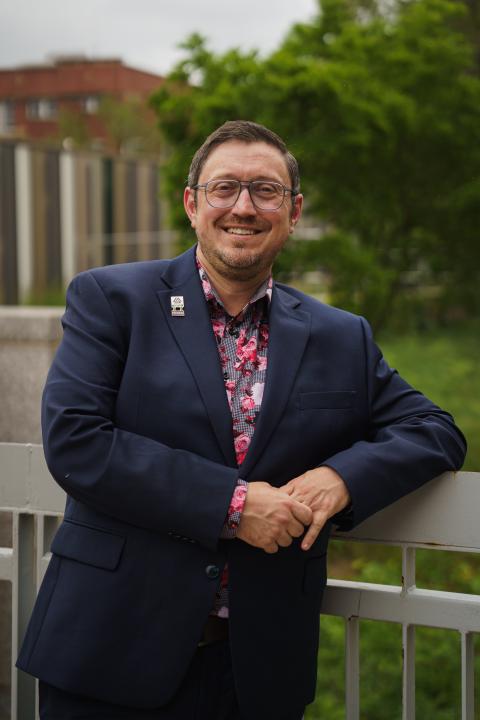Majoring in Biomedical Sciences: Medical Laboratory Science at UNH equips you with the skills and knowledge necessary for a critical role in healthcare diagnostics. This program offers in-depth training in laboratory techniques, including analyzing blood, tissues and other biological samples to diagnose diseases. With a strong emphasis on hands-on learning, you will gain practical experience in state-of-the-art labs, preparing you for certification and a career as medical laboratory scientist. This major is ideal for students interested in behind-the-scenes work in healthcare, offering excellent job prospects, job stability and the satisfaction of contributing to patient care and medical research.
WHAT IS MEDICAL LABORATORY SCIENCE?
Medical laboratory science is the branch of medicine where highly-educated professionals use sophisticated biomedical instrumentation and technology to analyze blood and bodily fluid to assist physicians in patient diagnosis, treatment, and disease monitoring. These services also aid public health efforts by providing critical data used to assess health and wellness in a community. Medical laboratory testing professionals work in various disciplines including clinical chemistry, hematology, immunology, immunohematology, microbiology, and molecular diagnostics.
WHY STUDY MEDICAL LABORATORY SCIENCE AT UNH?
The UNH BMS:MLS program has a unique structure that provides all learners with a solid foundation in diagnostic laboratory sciences. Students gain hands-on experience performing immunological, biochemical, molecular and microbiological procedures. The curriculum provides flexibility for a variety of career goals. Additionally, the UNH BMS:MLS program is the only NAACLS-accredited Medical Laboratory Science program in New Hampshire. Therefore, students who successfully complete a course of study that culminates in a clinical internship at an affiliated medical laboratory are eligible to sit for the national certification exams offered by the ASCP Board of Certification.
Potential careers
- Certified Medical Laboratory Scientist (ASCP)
- Diagnostic product developer
- Federal or state regulator
- Healthcare administrator
- Laboratory technician
- Physician
- Physician assistant
- Research scientist
Curriculum & Requirements
The Biomedical Science: Medical Laboratory Science (BMS:MLS) program provides you with the medical knowledge and understanding of diagnostic testing needed for a fulfilling career in the biomedical sciences, including as an American College of Clinical Pathology-certified Medical Laboratory Scientist.
As a Biomedical Science: Medical Laboratory Science major, you will:
- learn to determine the presence, extent, or absence of human disease through understanding the diagnostic testing that medical professionals use to make these determinations (70% of physician decisions are based on diagnostic testing results)
- obtain hands-on experience by performing immunological, biochemical, molecular, and microbiological procedures that aid in the diagnosis, treatment, and prevention of disease
Unique features of the MLS option include:
- the only 4-year degree program in NH that includes a path for students to become certified as Medical Laboratory Scientists (MLS) by the American Society of Clinical Pathology (ASCP) and that is accredited by the National Accrediting Agency for Clinical Laboratory Sciences (NAACLS)
- Certified Medical Laboratory Scientists are in high demand and easily find employment in hospitals and medical centers throughout the country
- the MLS program is affiliated with Dartmouth Hitchcock Medical Center and NorDx/Maine Medical Center
Careers or post-baccalaureate education of previous Medical Laboratory Science graduates include:
- certified medical laboratory scientists (ASCP) in diagnostic testing laboratories in hospitals and industry
- research scientists/laboratory technicians
- biotechnology and pharmaceutical companies
- biomedical research facilities
- forensic laboratories
- hospital reference laboratories
- government public health laboratories
- secondary school educators (with additional coursework in education)
- diagnostic product development
- sales and marketing
- state and federal government agencies (e.g., U.S. Food and Drug Administration).
- professional health programs
- medical school
- allied health programs (physician assistant, pathologists’ assistant, pharmacy)
- graduate programs
- microbiology
- biomedical science
- biochemistry
- nursing
- public health
- business administration
Sample Degree Plan
This sample degree plan serves as a general guide; students collaborate with their academic advisor to develop a personalized degree plan to meet their academic goals and program requirements.
| First Year | ||
|---|---|---|
| Fall | Credits | |
| MCBS 401 | Professional Perspectives in Molecular, Cellular, and Biomedical Sciences | 1 |
| ENGL 401 | First-Year Writing | 4 |
| BMS 507 or BIOL 411 | Human Anatomy and Physiology I or Introductory Biology: Molecular and Cellular | 4 |
| CHEM 403 | General Chemistry I | 4 |
| Discovery Course | 4 | |
| Credits | 17 | |
| Spring | ||
| BMS 508 | Human Anatomy and Physiology II | 4 |
| CHEM 404 | General Chemistry II | 4 |
| Statistics | 4 | |
| Discovery Course | 4 | |
| Credits | 16 | |
| Second Year | ||
| Fall | ||
| BMS 503 & BMS 504 | General Microbiology and General Microbiology Laboratory | 5 |
| GEN 604 | Principles of Genetics | 4 |
| Discovery Course | 4 | |
| Discovery Course | 4 | |
| Credits | 17 | |
| Spring | ||
| BMS 602 & BMS 603 | Pathogenic Microbiology and Pathogenic Microbiology Laboratory | 5 |
| BMS 560 & BMS 561 | Body Fluids and Body Fluids Laboratory | 4 |
| CHEM 545 & CHEM 546 | Organic Chemistry and Organic Chemistry Laboratory | 5 |
| Major Elective | 4 | |
| Credits | 18 | |
| Third Year | ||
| Fall | ||
| Major Elective with lab | 4-6 | |
| BMCB 658 & BMCB 659 | General Biochemistry and General Biochemistry Lab | 5 |
| BMS 650 | Molecular Diagnostics | 4 |
| Credits | 13-15 | |
| Spring | ||
| BMS 642 & BMS 643 | Clinical Immunology and Serology and Clinical Serology Laboratory | 4 |
| BMS 720 | Mycology, Parasitology, and Virology | 3 |
| Major Elective with lab | 4-5 | |
| Elective (any course) | 4 | |
| Credits | 15-16 | |
| Fourth Year | ||
| Fall | ||
| Major Elective (WI) | 4 | |
| Major Elective (Capstone) | 4 | |
| Discovery Course | 4 | |
| Elective (any course) | 4 | |
| Credits | 16 | |
| Spring | ||
| Four Electives (any courses) or BMS 751, BMS 752, BMS 753, and BMS 754 | 16-20 | |
| Credits | 16-20 | |
| Total Credits | 128-135 | |
Degree Requirements
All Major, Option and Elective Requirements as indicated.
*Major GPA requirements as indicated.
Major Requirements
The Medical Laboratory Sciences (MLS) program is NAACLS accredited and follows accreditation requirements.
Students in this option take four Foundation courses, five Bioscience Core courses, six BMS:MLS core courses, and five Major Elective courses. One capstone experience, supervised and approved within the major, is required of all seniors. The capstone explores areas of interest based on the integration of prior learning. In addition, all other University academic requirements must be completed, including those for the University Discovery Program and Writing Requirement.
A minimum grade of C- minus or above is required in BMS:MLS Core Courses.
Required Courses
| Code | Title | Credits |
|---|---|---|
| Foundation Courses | ||
| CHEM 403 | General Chemistry I 1 | 4 |
| CHEM 404 | General Chemistry II | 4 |
| CHEM 545 & CHEM 546 | Organic Chemistry and Organic Chemistry Laboratory 2 | 5 |
| Select one of the following statistics courses: 3 | 4 | |
BIOL 528 | Applied Biostatistics I | |
or PSYC 402 | Statistics in Psychology | |
or SOC 402 | Statistics | |
or MATH 439 | Statistical Discovery for Everyone | |
| Code | Title | Credits |
|---|---|---|
| Bioscience Core Courses | ||
| BMS 508 | Human Anatomy and Physiology II | 4 |
| GEN 604 | Principles of Genetics | 4 |
| BMCB 658 & BMCB 659 | General Biochemistry and General Biochemistry Lab | 5 |
| BMS 503 & BMS 504 | General Microbiology and General Microbiology Laboratory | 5 |
| Select one course from the following: | 4 | |
BMS 507 | Human Anatomy and Physiology I | |
BIOL 411 | Introductory Biology: Molecular and Cellular 2, 4 | |
- 1
CHEM 403 fulfills the Physical Science Discovery requirement.
- 2
Students applying to health profession schools need a full year of Organic Chemistry, a full year of Introductory Biology, and a full year of English. CHEM 651/CHEM 653 and CHEM 652/CHEM 654 should be taken in place of CHEM 545/CHEM 546; ENGL 502 or ENGL 503 is suggested in addition to ENGL 401. See Pre-Professional Health Program Advising.
- 3
Statistics fulfills the Quantitative Reasoning Discovery requirement.
- 4
BIOL 411 fulfills the Biological Science Discovery requirement, Discovery Laboratory requirement, and the Discovery Inquiry requirement
| Code | Title | Credits |
|---|---|---|
| BMS-MLS Core Courses | ||
| BMS 560 & BMS 561 | Body Fluids and Body Fluids Laboratory | 4 |
| MCBS 401 | Professional Perspectives in Molecular, Cellular, and Biomedical Sciences | 1 |
| BMS 602 & BMS 603 | Pathogenic Microbiology and Pathogenic Microbiology Laboratory | 5 |
| BMS 642 & BMS 643 | Clinical Immunology and Serology and Clinical Serology Laboratory | 4 |
| BMS 650 | Molecular Diagnostics | 4 |
| BMS 720 | Mycology, Parasitology, and Virology 5 | 3 |
BMS-MLS Major Electives
FIVE (5) unique Major Electives are required. Two courses must include a laboratory component.
| Code | Title | Credits |
|---|---|---|
| Select two major electives with a laboratory | ||
| BMS 623 | Histology: Microscopic Cellular Structure and Function | 4 |
| BMS 644 & BMS 645 | Clinical Hematology and Clinical Hematology Laboratory 6 | 5 |
| BMS 656 & BMS 657 | Immunohematology and Blood Banking Laboratory 6 | 4 |
| BMS 658 & BMS 659 | Medical Biochemistry and Clinical Chemistry Laboratory 6 | 5 |
| BMS 706 & BMS 708 | Virology and Virology Laboratory | 5 |
| BMS 721 | Mycology, Parasitology, and Virology Laboratory 5,6 | 2 |
| BMS 725 | Cell Phenotyping and Tissue Engineering Laboratory | 4 |
| BMS 740 | Human Microbiome | 4 |
| BMCB 753 | Cell Culture | 5 |
| Code | Title | Credits |
|---|---|---|
| Select three major electives from the following: 5 | ||
| BMS 610 | Biomedical Lab Management 6 | 4 |
| BMS 623 | Histology: Microscopic Cellular Structure and Function | 4 |
| BMS 635 | Preceptorial in Prehospital Care | 2 |
| BMS 640 | Phlebotomy Theory 6 | 2 |
| BMS 641 | Phlebotomy Clinical Internship 6 | 1-2 |
| BMS 644 | Clinical Hematology 6 | 3 |
| BMS 644 & BMS 645 | Clinical Hematology and Clinical Hematology Laboratory 6 | 5 |
| BMS 644 & BMS 646 | Clinical Hematology and Clinical Hemostasis 6 | 4 |
| BMS 656 & BMS 657 | Immunohematology and Blood Banking Laboratory 6 | 4 |
| BMS 658 & BMS 659 | Medical Biochemistry and Clinical Chemistry Laboratory 6 | 5 |
| BMS 702 | Endocrinology | 4 |
| BMS 703 | Infectious Disease and Health | 4 |
| BMS 704 | Pathologic Basis of Disease | 4 |
| BMS 706 & BMS 708 | Virology and Virology Laboratory | 5 |
| BMS 711 | 4 | |
| BMS 719 | Host-Microbe Interactions | 4 |
| BMS 725 | Cell Phenotyping and Tissue Engineering Laboratory | 4 |
| BMS 730 | Ethical Issues in Biomedical Science | 4 |
| BMS 735 | Molecular and Cellular Parasitology | 4 |
| BMS 740 | Human Microbiome | 4 |
| BMS 749 | Case Studies in Hematology and Immunology | 2 |
| BMS 750 | Case Studies in Microbiology 6 | 2 |
| BMS 751 | Advanced Clinical Microbiology Internship 6 | 5 |
| BMS 752 | Advanced Hematology Internship 6 | 5 |
| BMS 753 | Advanced Immunohematology Internship 6 | 5 |
| BMS 754 | Advanced Clinical Chemistry Internship 6 | 5 |
| BMS 790 | Undergraduate Teaching Experience | 1-4 |
| BMS 795 | Investigations in Biomedical Science | 1-8 |
| BMS 795W | Investigations in Biomedical Science | 1-8 |
| BMS 799 | Senior Thesis (4-credit minimum) | 1-4 |
| BMS 799H | Senior Honors Thesis (4-credit minimum) | 1-4 |
| BMCB 605 | Principles of Cell Biology | 4 |
| BMCB 753 | Cell Culture | 5 |
| BMCB 760 | Pharmacology | 4 |
| GEN 706 | Human Genetics | 4 |
| GEN 721 | Comparative Genomics | 4 |
| SOC 635W | Medical Sociology | 4 |
| Other Internships 7 | ||
- 5
If BMS 721 is taken concurrently with BMS 720, it may count as one of the two required Laboratory Electives. However, BMS 721 is not a Major Elective course, so five Major Electives must still be completed, at least one of which includes a lab component, plus four additional Major Electives with or without lab.
- 6
Required for students interested in MLS clinical generalist internship
- 7
A 20 credit Clinical Hematology Internship covering advanced instruction in hematology and hemostasis at a local hospital or reference laboratory is also available. Please see your advisor for information.
Capstone
The capstone explores areas of interest based on the integration of prior learning. The capstone requirement may be satisfied through a course, created work or product, or some form of experiential learning (e.g., honors thesis, mentored research project, or other special student activity). Students may take more than one capstone course. Capstone completion is never displayed on Degree Works; your advisor will certify capstone completion at the time of graduation. Students must have 90 credits or more when completing their capstone requirement. See your advisor for questions about capstones.
| Code | Title | Credits |
|---|---|---|
| Approved BMS-MLS Capstone Courses | ||
| BMS 656 | Immunohematology | 3 |
| BMS 658 | Medical Biochemistry | 3 |
| BMS 719 | Host-Microbe Interactions | 4 |
| BMS 725 | Cell Phenotyping and Tissue Engineering Laboratory | 4 |
| BMS 740 | Human Microbiome | 4 |
| BMS 747 | Case Studies in Bloodbanking | 1 |
| BMS 748 | Case Studies in Medical Biochemistry | 1 |
| BMS 749 | Case Studies in Hematology and Immunology | 2 |
| BMS 750 | Case Studies in Microbiology | 2 |
| BMS 751 | Advanced Clinical Microbiology Internship | 5 |
| BMS 752 | Advanced Hematology Internship | 5 |
| BMS 753 | Advanced Immunohematology Internship | 5 |
| BMS 754 | Advanced Clinical Chemistry Internship | 5 |
| BMS 790 | Undergraduate Teaching Experience (2 semesters, including lab presentation or instruction) | 1-4 |
| BMS 795 | Investigations in Biomedical Science | 1-8 |
| BMS 795W | Investigations in Biomedical Science | 1-8 |
| BMS 799 | Senior Thesis (4-credit minimum) | 1-4 |
| BMS 799H | Senior Honors Thesis (4-credit minimum) | 1-4 |
| BMCB 753 | Cell Culture | 5 |
| INCO 790 | Advanced Research Experience (4-credit minimum) | 1-4 |
| Other Internships 7 | ||
For a Capstone experience not listed above, such as an internship, submit a Capstone Experience Approval form prior to beginning the experience.
Program Learning Outcomes
Core Knowledge
- Students will demonstrate an understanding of core knowledge in biochemistry, molecular biology, cell biology, genetics and biomedical sciences.
Quantitative Literacy, Inquiry & Analysis
- Students will be able to apply the scientific method to examine experimental evidence and draw informed conclusions.
- Students will be able to use graphs to represent scientific data.
- Students will be able to apply statistical methods to interpret scientific data.
Critical Thinking & Problem Solving
- Students will be able to use data to troubleshoot an unexpected outcome.
- Students will be able to apply core knowledge to critically interpret scientific data.
Written Communication
- Students will demonstrate written skills to communicate scientific knowledge and experimental data.
Oral Communication
- Students will be able to demonstrate oral presentation skills to communicate scientific knowledge and experimental data.
Biomedical Science: Medical Laboratory Sciences option
- Students will be able to correlate patient history, symptoms and laboratory test results with the diagnosis and treatment of clinical disease state
- Students will be able to interpret, analyze, and identify clinical laboratory results.
- Students will be able to define the mechanisms that give rise to human diseases and/or organ system dysfunction, including hypersensitivity, renal disease, acid-base disorders, etc.
- Students will be able to recognize risk factors for the development of disease
- Students will be able to identify and explain the underlying principle(s) of appropriate testing methodologies and assays for diagnosis of clinical diseases and organ system dysfunction.
Explore Program Details
As part of the University of New Hampshire’s Discovery Program requirements, all students must complete a Capstone experience.
Advising is available for UNH students, alumni, and post baccalaureates pursuing health professional careers.
The Pre-Health Advising Office provides support throughout the process of preparing for health professions school from advising on the courses they should take to helping navigate through the complex steps of the application process.
Register with Pre-Professional Health Office
Student Handbook
- Program Handbook Apr 2025.pdf (373.83 KB)
The Clinical option within the Medical Laboratory Science program had the following outcomes:
| Class of 2022 | Class of 2023 | Class of 2024 | Three-Year Average | |
| Job Placement | 100% | 100% | 100% | 100% |
| Graduation Rate* | 100% | 100% | 100% | 100% |
| ASCP-BOC Pass Rate | 83% | 92% | 88% | 88% |
*For students entering the final half of the program
The UNH Medical Laboratory Science Program is accredited by the National Accrediting Agency for Clinical Laboratory Science. You may contact NAACLS for more information on the web at: www.naccls.org or at 5600 N. River Road Suite 720, Rosemont, IL, 60018-2119. Telephone: 773.714.8880.
Students interested in the Biomedical Sciences: Medical Laboratory Science major may also be interested in the following advanced degrees at UNH. Students in the program also have the opportunity to participate in the UNH accelerated master’s program.
Molecular and Cellular Biotechnology M.S.
Molecular and Evolutionary Systems Biology Ph.D.
Biotechnology: Industrial and Biomedical Sciences, Manchester M.S.
The UNH BMS:MLS Program maintains clinical affiliation agreements with a variety of clinical laboratories in New Hampshire and surrounding states. These affiliated clinical laboratories are where students pursuing the clinical internship course of study can be placed to complete their internship requirements.
Sites include - but are not limited to:
· Dartmouth Hitchcock Medical Center - Lebanon, NH
· Cheshire Medical Center – Keene, NH
· Boston Children’s Hospital – Boston, MA
· Elliot Hospital – Manchester, NH
· Concord Hospital – Concord, MA
· NorDx – Scarborough, ME
· Wentworth Douglass Hospital – Dover, NH
For information on other clinical affiliates or to inquire about becoming a clinical affiliate, please contact the BMS: MLS Program Director
